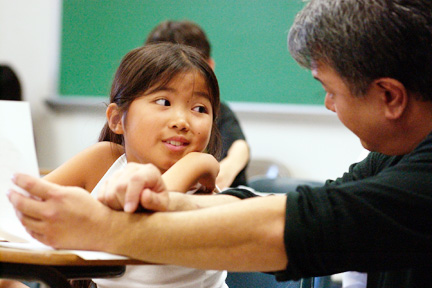
|
Poetry’s Power
Winners of the Star Poets contest
fearlessly write of love, war, nature
and growing up
The packed theater goes quiet as Tori Teramae approaches the microphone.
"Little green fingers," she starts, standing on her tippy-toes to reach the mouthpiece. "Swaying slowly side to side, tickling my legs."
The haiku draws immediate applause. And the Momilani Elementary third-grader, its proud author, seems satisfied, nodding her head slightly before skipping back to her seat.
The reading was one of 34 given yesterday by students from third grade to 12th at a one-of-a-kind celebration of children's poetry -- the sixth annual Star Poets contest -- that is aimed at encouraging literacy and creativity.
More than 500 children and parents attended the event at Windward Community College, listening in on poetry workshops given by professional writers, including acclaimed Hawaii author Lois-Ann Yamanaka, and ruminating over the meanings in some 71 poems chosen as contest winners out of nearly 3,000 submitted from around the state.
The poems that got top honors dealt with love, war, nature and growing up -- among other weighty topics. "We don't give kids enough credit," said English professor Libby Young, the event's organizer. "Poetry is one way that allows them to express these deep feelings ... (and to see) what kids are thinking about and worried about."
Rachel Ray, a fifth-grader at Kaneohe Elementary School, wrote about her father leaving in a poem called, "The Journey of Losses." He came back from Montana six months later and couldn't help but get teary-eyed after reading her piece.
"There was a lump in my throat," he said, adding that his daughter uses poetry as a sort of therapy.
Ray's poem, which took first place for her grade level, begins, "My eyes are salty waterfalls/Nothing can stop my tears from flowing." Ray said she writes poems in her spare time and packs them with the emotional ups-and-downs of life.
"You can write about whatever you want," she said. "You're just free to do it."

But she still writes about what she knows.
The third-grader's prize-winning poem, "Dance to the Rhythm of Chinatown," pays special homage to the place where she spends much of her time. "Lions prancing, jumping, climbing," the piece starts off. "Fun to watch."
Wang's parents, who own a cafe in Chinatown, said they were surprised to learn that their daughter was a poet. Her teacher at St. Theresa's School, Noreen Ueda, wasn't. But she also said Wang's poem took lots of work -- and several revisions.
"Poetry is not easy," Ueda said, smiling at her student.
Before the poetry readings yesterday, Steve Robinow and his wife, Rena Duhl, took a moment to catch up on their own reading under the shade of an eave as their eighth-grade daughter was in a workshop.
The couple was anxiously waiting to hear their daughter's poem, which she asked them not to read ahead of time.
The piece, entitled "Dad," starts with, "We always fight, screaming back and forth."
It ends, though, on a more positive note:
My face is now wet with frustrated tears;
You see me crying and come over
to give me a hug.
My body is stiff and unforgiving,
but I slowly melt into your embrace.
You go to wash the dishes,
as I go upstairs to think of
better comebacks for tomorrow.
[News] [Business] [Features] [Sports] [Editorial] [Do It Electric!]
[Classified Ads] [Search] [Subscribe] [Info] [Letter to Editor]
[Feedback]
